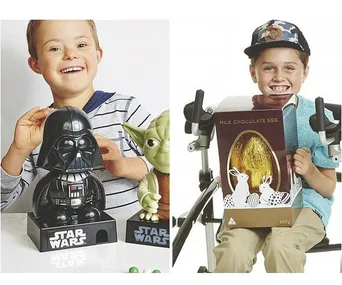Hannah Aylward, 23, shares her true life story;
With a sigh, I closed my books and flicked open my laptop.
I was midway through my final exams for my sociology degree and needed something to take my mind off my studies so I started watching documentaries on YouTube.
This looks interesting, I thought and started watching a film on a guy, Shane Burcaw, with spinal muscular atrophy, a genetic condition causing muscle weakness and problems with movement.
The film showed him in his wheelchair, going about his daily business. But what was so captivating was Shane’s positive attitude and his sense of humour.
“Life is better when you’re laughing,” he explained in the film.
It was admirable.
Shane had been in a wheelchair since he was two.
His body was small and skinny but his personality was larger than life.
There was something very attractive about him, too.
Afterwards, I clicked onto his blog ‘Laughing At My Nightmare’.
Three hours later, I was still reading.
Before I realised I was doing it, I fired off an email to him, explaining how much I liked his writing and how we shared the same passions and dry sense of humour.
PS. I think you’re cute, I said at the end.
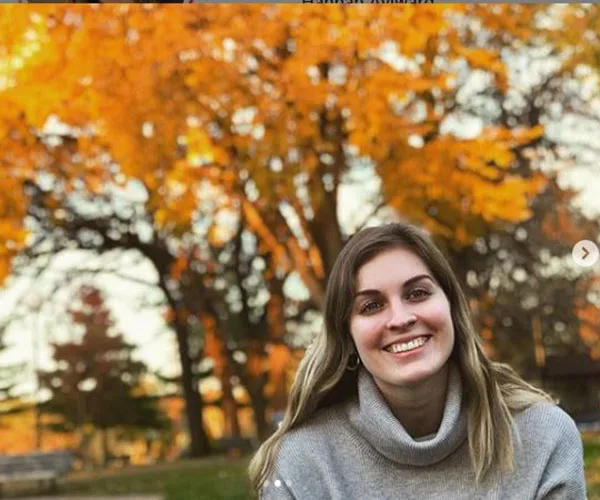
I took a chance by emailing him. Photo credit: Hannah Aylward
Next morning, there was a response in my inbox. My heart fluttered as I read it.
Texts and emails flew back and forth between us and by the end of the week, when my exams had finished, we had our first video call.
“Well hey,” I said, shyly.
I’m an introvert but Shane is the opposite.
He immediately put me at ease and we chatted for hours.
Soon I was home for the holidays so I told my parents about Shane.
They were more concerned that I was chatting to a man I’d met on the internet than his disability.
“Why don’t you introduce them to me when we next talk?” Shane suggested.
So I did and they liked him as much as I did.
Things developed fast and within two weeks we’d told each other we loved each other.
Some people think it’s strange for an able-bodied woman like myself to be attracted to a disabled man but I like the way Shane looks.
The only problem was we lived 1880km away from each other, so after a couple of months we arranged for me to stay with him and his parents for a weekend.
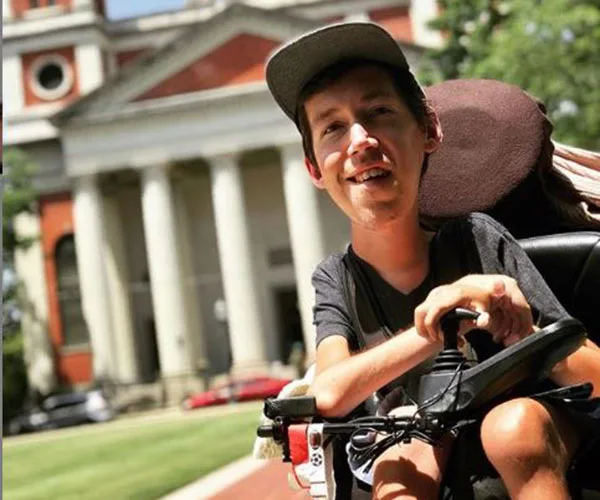
Shane’s positive outlook in infectious!
Photo credit: Shane Burcaw
Before I flew out, we discussed how much of his care I would do.
“I want to learn how to do it all,” I said.
Shane created a Bingo sheet of tasks ranging from brushing his hair, feeding him soup to getting him in and out of bed.
“You can stamp them off the sheet like in Bingo,” he teased.
As a joke, he included things like “Kiss me” or “Tell me I’m handsome.”
On the plane over, I felt so nervous. But as soon as I saw Shane my nerves evaporated.
For the next few hours, I chatted to him, his brother and his parents until we were able to go to his room and be alone for the first time.
There, we shared our first kiss and it was beautiful.
Doing his care never felt like a chore because he made light of it.
I’m a swimmer, so quite strong, and Shane only weighs 27kg so I could easily lift him from his chair.
But as I did it, he said hilarious things like, “Imagine you drop me right now.”
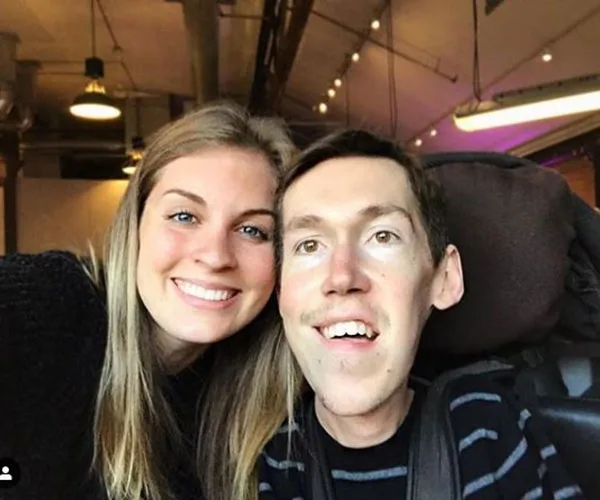
Living together is bliss.
Photo credit: Shane Burcaw
One evening, we were having a meal at a diner when a stranger came up to him, placed her hands on his shoulders and closed her eyes.
“Dear Lord,” she prayed. “Give this poor boy a happy life.”
“I have a happy life, thank you,” Shane replied.
People couldn’t compute that Shane was happy with the way he was.
They also assumed that because he was in a wheelchair he couldn’t think or interact for himself.
On another occasion, we were having a picnic in a park.
A man was blowing bubbles for his toddlers when he ran up to us and said to me excitedly,
“Would he like to blow bubbles, too?”
Shane smiled at him and said, “No thank you.”
“How do you put up with this?” I asked Shane afterwards but he’d lived with it his whole life.
People’s ignorance was normal to him, but it irritated me.
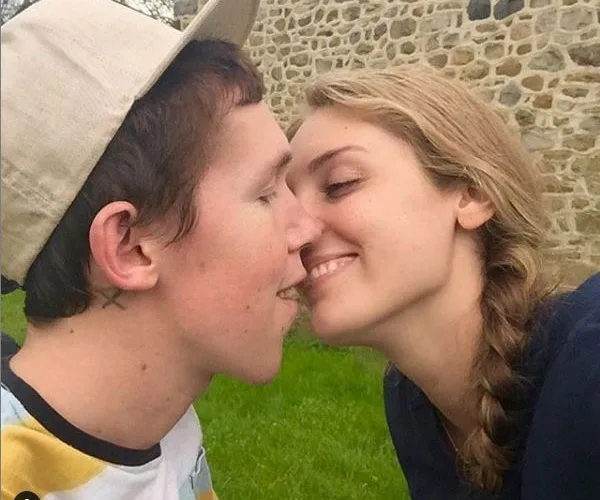
We are so happy and in love.
Photo credit: Shane Burcaw
Over the next two years we maintained a long-distance relationship but I visited Shane every six weeks or so.
Finally he moved up to be with me.
We made a couple of minor adjustments to the unit to make it wheelchair accessible but soon we were living as a proper couple.
It was bliss.
I continued to study while Shane wrote his books and managed his disability charity that he founded.
I did all of Shane’s care, including helping him on the toilet, but it didn’t bother me.
His upbeat way of life was infectious.
We started filming our lives together and posted the videos on our YouTube channel called Squirmy and Grubbs, our nicknames for each other. It quickly grew.
Like me, people were charmed by Shane’s humour and positive attitude.
But it also didn’t take long for haters to emerge.
“She’s in it for his money,” one person wrote.
“What money?” Shane joked.
They came up with a myriad of false reasons for why I was with Shane, which hurt, but that was exactly why we were doing it.
One woman was particularly mean but after three months she wrote to us and said, “I’m sorry. I’ve changed my mind and can tell you guys are genuine.”
Now if anyone leaves a nasty comment she’s the first to back us up.
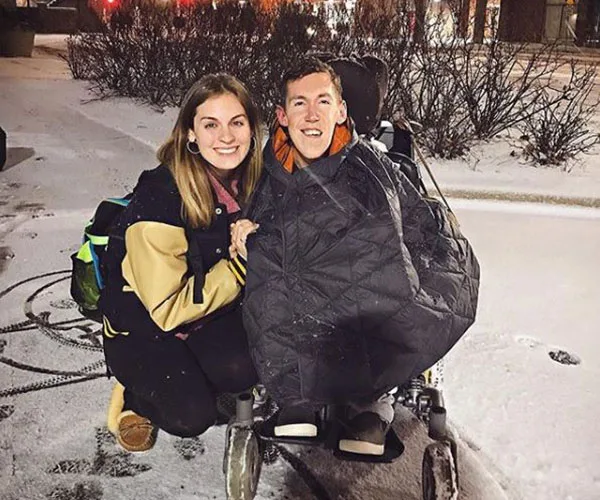
We live a full life and love to go travelling.
Photo credit: Shane Burcaw
We document the mundane things we do together as a couple but also the bizarre things that happen, like strangers assuming I’m Shane’s nurse, or worse, his mother!
Our YouTube channel has over 150,000 subscribers.
We’ve been interviewed by the media and created a platform to encourage people to question their own assumptions about people with disabilities.
Shane and I have a loving and intimate relationship.
Yes, we do have sex.
We go travelling together and hope to get married and have kids one day.
If we do that, I’ll get tested for the SMA gene as it needs both parents to be carriers for it to be passed down.
In the meanwhile, Shane takes a drug to ensure his disease won’t progress any further.
He has a book called Strangers Assume My Girlfriend is my Nurse.
We’ve been together for three years and I adore him.
0We hope our story continues to inspire other inter-abled relationships, and teach the world that love comes in all sorts of different packages.
Strangers Assume My Girlfriend Is My Nurse by Shane Burcaw (Roaring Brook) is out now.

